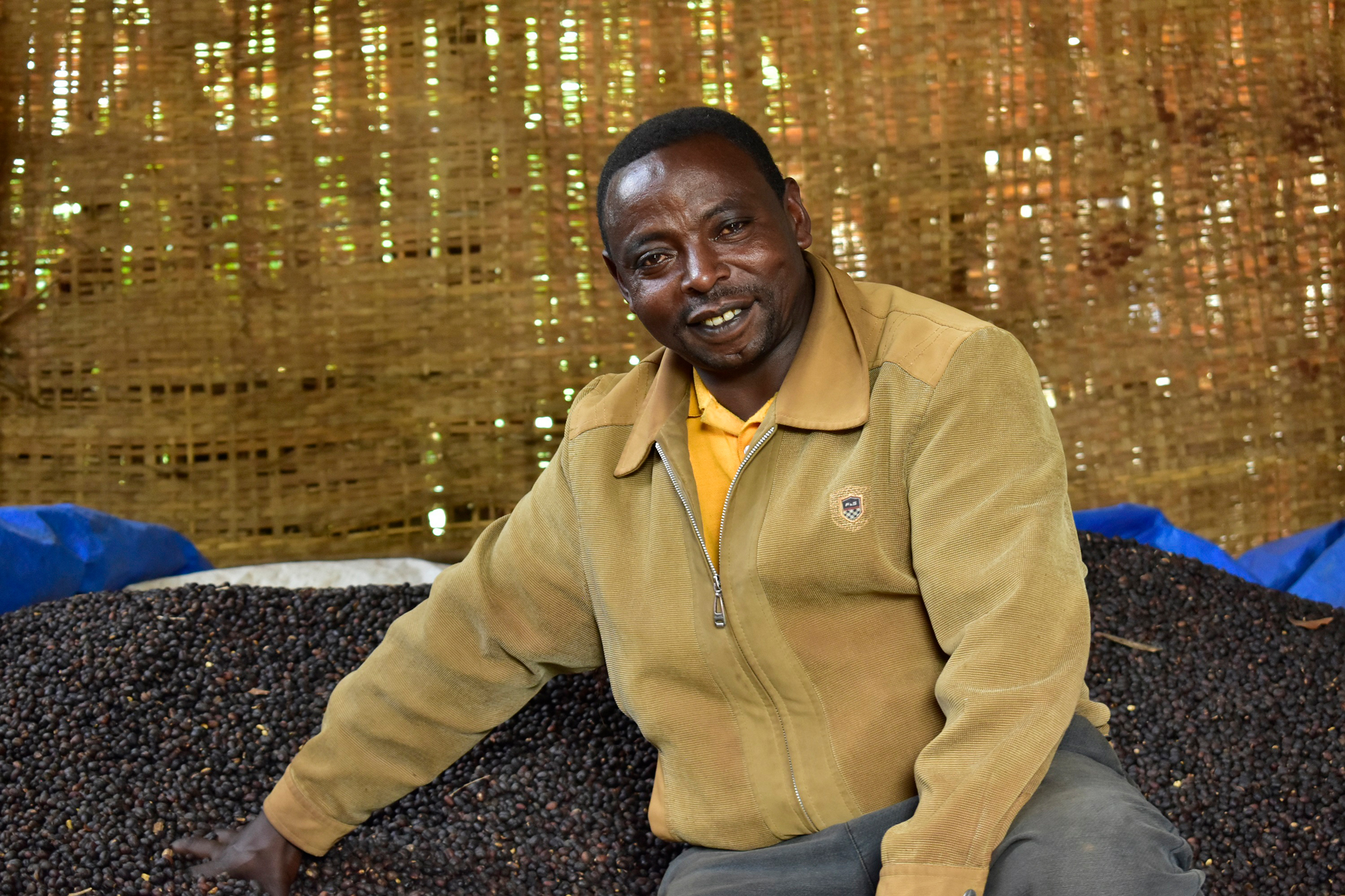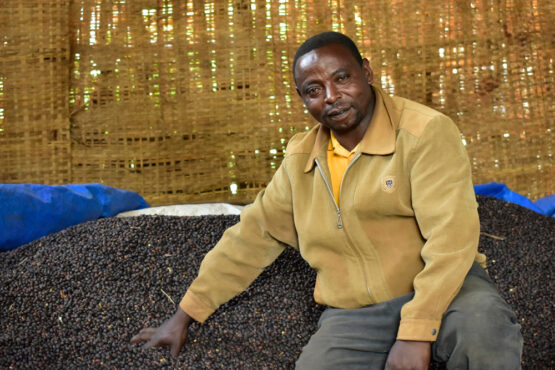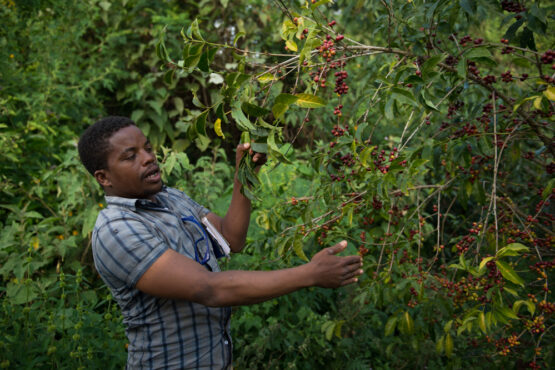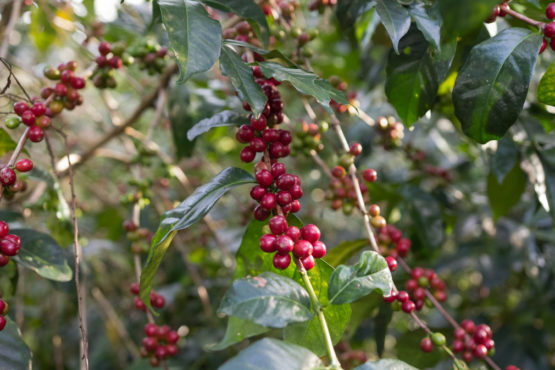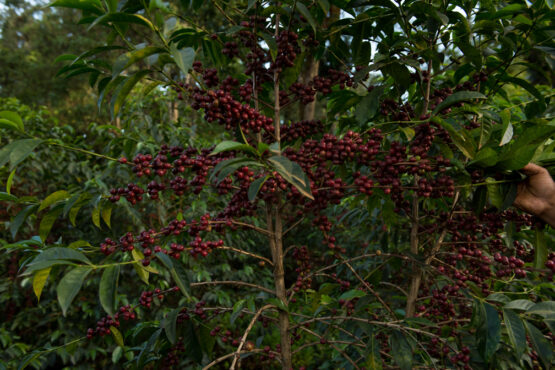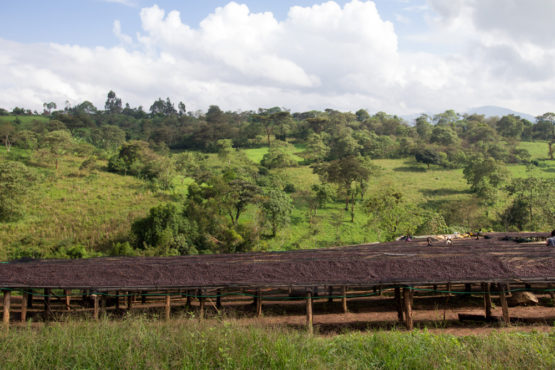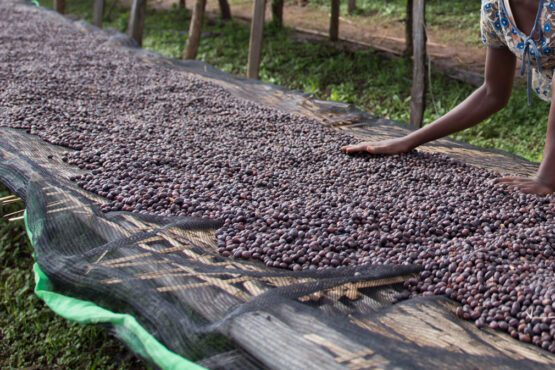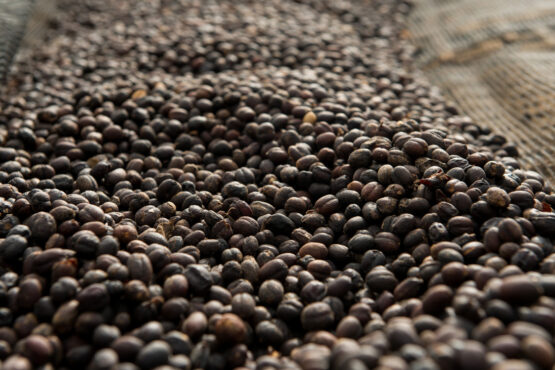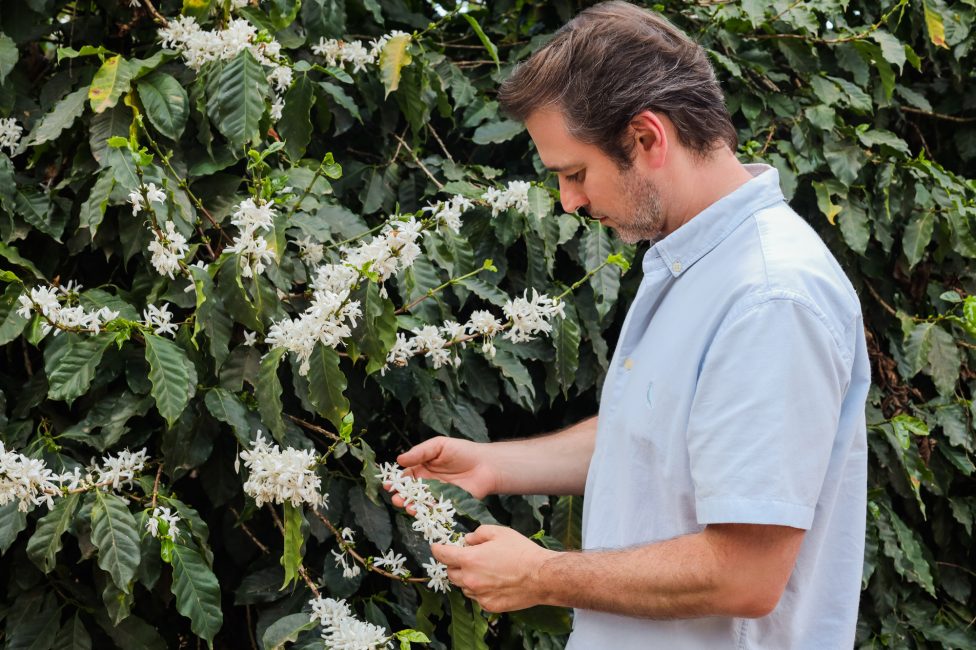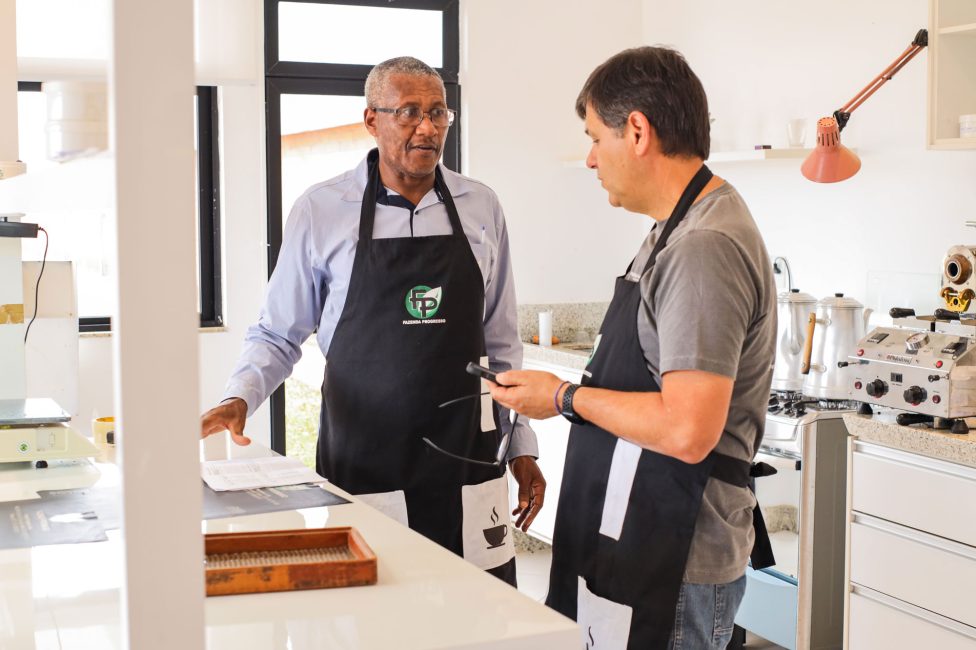Bogale Turkey Natural
Intensely sweet, with blackcurrant, berries and concord grape. Black tea and chocolate mousse on the finish, with a syrupy body.
This coffee was produced by Bogale Turkey, who grows and processes coffee on his 13-hectare farm, Banko Calcale. Bogale’s farm is located near the woreda (administrative district) of Gedeb, in the renowned coffee region of Sidama, in the southeast of Ethiopia. The farm is privately owned and operated by Bogale, who is a member of the Lalisaa Project, an initiative that aims to provide opportunity and resources for smallholder farmers in Sidama.
The farm sits at a staggeringly high elevation of 2019m above sea level. The high elevation of the farm, combined region’s cool climate is ideal for the slow ripening of coffee cherries, leading to denser beans and a sweeter, more complex cup profile. Coffee is grown as a cash crop, alongside other food crops like corn, grain and bananas. The coffee is intercropped amongst native forest and grows under the shade of Birbira, Wanza, and Acacia trees. Like many Ethiopian smallholder farmers, Bogale uses organic farming practices that rely heavily on the manual labour of him and his family.
ABOUT THE LALISAA PROJECT
The Lalisaa Project was established in 2018 to support producers in marketing and exporting their coffees outside of the ECX system. In Amharic, the word ‘lalisaa’ means to grow or flourish, and by participating in the program, smallholder coffee farmers and quality-focused coffee washing stations are able to access support and resources that will help them thrive.
The goal of the project is to improve the quantity and quality of coffee produced by partnered producers, by improving farming and processing practices. This, in turn, will contribute to increased prices and improved social and environmental standards for the producing communities. Ultimately, the project is designed to cultivate a strong, well-informed and independent supply chain, that doesn’t rely on financial aid or intervention from exporters and importers.
Over a three-year period, smallholder farmers who have joined the Lalisaa Project progress through three stages of the program: pre-selection, acceleration and graduation. At each stage, they are assessed for participation and engagement and only advanced if they meet certain criteria. As they advance through the curriculum, farmers are assisted in creating farm-specific management plans, accessing short-term and long-term financing and attending industry events to connect to international markets and gain industry exposure. Via workshops and farm visits, they also have access to an expert agronomist, who advises on farming and processing practices, including the propagating seedlings, how and when to use inputs, how to prune, selective harvesting of ripe cherries, and multi-cropping the land.
As of 2021, there are 50 farmers enrolled in the Lalisaa Project curriculum across three micro-regions; Yirgacheffee, Kochere and Gedeb, which are all located within the Sidama Coffee Zone. The farmers are visited by agronomist Shimelis Bogale, who is based out of Yirgacheffee and facilitates training sessions and gives farm-specific advice on improving yields and quality. As Shimelis states:
“My main responsibilities are facilitating and coordinating the program; monitoring and evaluating the program and developing agronomy and quality control training modules… I provide training and coaching for coffee producers… from the nursery to the final production stage – picking, sorting, processing, drying, moisture control and controlling jenfel (natural processed) coffee quality”
While Covid-19 has stalled some of the goals of the project, many of the participating farmers have recorded an improvement in quality, and some, like Bogale Turkey, have been able to secure high premiums for their crop from international buyers. We are excited to continue to buy coffee through the Lalisaa Project and to contribute to its ultimate goal of an independent and knowledgeable supply chain.
ABOUT THE SIDAMA ZONE
Sidama is a wide geographical classification that encompasses much of central-south Ethiopia and includes renowned coffee producing localities such as Yirgacheffe, Kochere, Gedeb, West Arsi, Bensa and Guji. Sidama is located in Ethiopia’s South East Coffee Zone, extending across the states of Southern Oromia and the Southern Nations, Nationalities, and People’s Region (SNNPR), one of nine ethnically based regional states of Ethiopia. The Sidama zone is named for the Sidama people; a tribe with a long and proud history of coffee production. After a 2019 Referendum, the Sidama zone has separated from the SNNPR and become the autonomous Sidama Region.
Sidama is a renowned coffee area and produces exceptional natural and washed coffees that showcase an extremely diverse range of flavour profiles. Coffees from Sidama are noted for their intensely fruit-forward, tea-like, floral and complex character and are sought after worldwide. It is widely accepted that the coffee species, Arabica, originated in the lush forests of southern forests of Ethiopia and hence growing conditions in this area are perfectly suited for producing exquisite coffees.
Coffee has been cultivated in the Sidama Zone for centuries and is an important source of income for rural households, who grow it as the primary cash crop. Family plots are small and intensively farmed with intercropped coffee, food crops like pulses, grain and yams, and other cash crops like khat (similar to tobacco) and Ethiopian banana. Most farms are planted amongst or alongside indigenous forest trees, which provide a thick canopy of shade for the coffee trees. Historically, farmers in this area will use organic farming practices (although it is unlikely to be certified) as there is no ready access to artificial fertilisers or pesticides.
VARIETY
For many years, most Ethiopian coffee has only been described as being a mix of varieties that we refer to as “heirloom varieties.” This is a term that is all-encompassing and used by many actors in the coffee industry to generally categorise Ethiopian coffee varieties that are from native forest origins. Whilst this describes many of the varieties found in Ethiopia, it is also a bit simplistic and does not acknowledge the varieties that are already locally recognised and cultivated, or those that have been specifically developed and widely distributed by the Jimma Agricultural Research Centre (JARC).
This coffee is a mix of three of those locally recognised native varieties, Welsh, Dega, and Kudhumi, and two JARC varieties, 74110 and 74112. Ethiopia is home to many native or “landrace” varieties in the region that were originally selected from the forest and have been propagated in the Sidama region for decades. There are five popular ones that all have been named after indigenous trees in the area—they are Bedessa, Kudhumi, Mique, Sawe and Welisho/Walichu. There is little documentation on the history of these varieties, and it is hard to know if they represent single varieties or a wider group of varieties, however, it is widely accepted that they play a major role in the quality of the coffee from this region, with a distinctive floral and citric cup profile. Along with these, JARC varieties are grown for disease and pest resistance, rather than only for cup profile, and are released by number. For example, 74110, 74112 and 74116 are all widely propagated in the Sidama growing region.
PROCESSING
This coffee was processed using the natural method; a complex process requiring a high level of attention to detail in order to be done well. Ethiopian coffee has been processed this way by generations of farmers who have mastered the art of the natural method through centuries of tradition and experience.
In collaboration with Lalisaa Project, Bogale employs best practices to dry his natural processed coffees, as the aim is to produce high quality, exportable grade coffee. This coffee is classified as Grade 1, indicating that a lot of effort has been put into the selection, grading and drying to ensure the very highest quality coffee is produced.
Each day, Bogale and his team selectively handpick the ripest red cherries. The cherries are meticulously hand-sorted prior to processing to remove unripe, overripe, or damaged fruit, in order to enhance the quality and sweetness of the cup.
The coffee is then graded by weight and spread evenly on raised African beds (screens) to dry in the sun. Initially, it is laid very thinly and turned regularly to ensure consistent drying and prevent over-fermentation. This is done very carefully to avoid damage to the fruit. Bogale currently has 63 raised drying beds on his farm.
After a few days, when the coffee has reached 25% humidity—this is called the “raisin stage”—the layers of coffee are gradually increased. Careful attention and control during this drying phase ensures the coffee is stable and that a clean and balanced cup profile is achieved. The coffee is turned constantly whilst drying to ensure that it dries evenly and consistently. At midday, the coffee is covered to protect it from full sun. It is also covered overnight to prevent damage from morning dew.
Once the coffee reaches the optimum moisture level (usually over 2-4 weeks, depending on weather conditions). The coffee is then moved to an onsite warehouse where it is rested (or ‘conditioned’) before being transported to the dry mill to be hulled and sorted before export.
HOW THIS COFFEE WAS SOURCED
Since 2017, regulation changes within the Ethiopian coffee industry have allowed smallholder producers and coffee washing stations to export coffee directly to the international market, rather than through the Ethiopian Commodity Exchange (ECX). While the ECX has provided stability and opportunity for many Ethiopian coffee farmers, it does not service the specialty market well as there is an inherent lack of transparency and traceability in its auction model and more points for potential corruption or confusion between the producing communities and final buyer.
The recent changes enable a more streamlined coffee supply chain and provide an opportunity for the increased traceability and transparency of coffee trade in Ethiopia. Beyond this, producers who market and trade their coffee directly can access higher prices and more direct payments for their coffees.
This coffee was sourced through our Ethiopian supply partner, Sucafina, who help connect us to single estates, privately owned washing stations and quality-focused exporters in different regions of Ethiopia. All of the coffee we purchase in Ethiopia is bought outside of the ECX system.
WHY WE LOVE IT
Natural processed Ethiopians are renowned for their intense fruit character, rich sweetness and winey acidity. We think this lot from Bogale Turkey is one of the best we’ve tasted! We love how intensely sweet and juicy this lot is, with distinct blackcurrant and concord grape in the cup.
